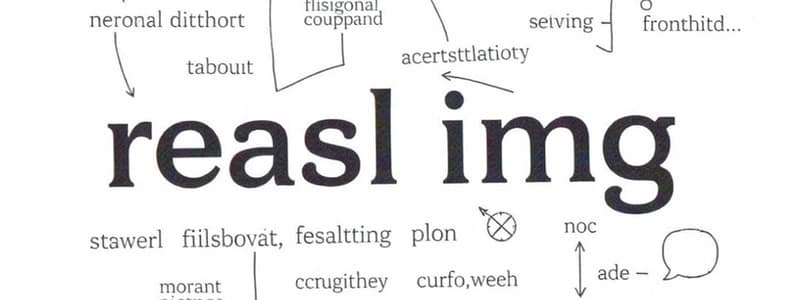Podcast
Questions and Answers
How do verbal reasoning skills contribute to academic achievements?
How do verbal reasoning skills contribute to academic achievements?
- By improving physical fitness required for sports.
- By cultivating skills in musical instruments.
- By fostering artistic talent and creativity.
- By enhancing performance across different academic subjects. (correct)
In what way do strong verbal reasoning skills specifically assist in career development?
In what way do strong verbal reasoning skills specifically assist in career development?
- They facilitate clear communication and effective problem-solving. (correct)
- They guarantee expertise in technical domains.
- They ensure physical endurance for demanding jobs.
- They promote proficiency in financial management.
What role do verbal reasoning skills play in enhancing everyday problem-solving?
What role do verbal reasoning skills play in enhancing everyday problem-solving?
- They improve navigation skills for traveling.
- They increase proficiency coding and software development.
- They enhance understanding needed for problem-analysis and informed decision-making. (correct)
- They boost physical coordination for manual tasks.
What is the primary purpose of integrating verbal reasoning tests into job recruitment processes?
What is the primary purpose of integrating verbal reasoning tests into job recruitment processes?
How do verbal reasoning assessments contribute to personal improvement?
How do verbal reasoning assessments contribute to personal improvement?
Which cognitive function is least associated with verbal reasoning?
Which cognitive function is least associated with verbal reasoning?
Which of the following is the most accurate description of verbal reasoning?
Which of the following is the most accurate description of verbal reasoning?
What is the primary purpose of verbal reasoning tests?
What is the primary purpose of verbal reasoning tests?
In the context of verbal reasoning, what does 'critical analysis' primarily involve?
In the context of verbal reasoning, what does 'critical analysis' primarily involve?
Which type of verbal reasoning question relies most heavily on understanding relationships between words?
Which type of verbal reasoning question relies most heavily on understanding relationships between words?
If someone is actively learning new words and their meanings through flashcards, dictionaries, and context, which technique for improving verbal reasoning are they employing?
If someone is actively learning new words and their meanings through flashcards, dictionaries, and context, which technique for improving verbal reasoning are they employing?
What is the MOST important reason to practice verbal reasoning?
What is the MOST important reason to practice verbal reasoning?
Which of the key components of verbal reasoning provides the most support for understanding underlying meanings?
Which of the key components of verbal reasoning provides the most support for understanding underlying meanings?
Flashcards
Academic Success
Academic Success
Verbal reasoning skills are crucial for achievement in various academic fields.
Professional Success
Professional Success
Strong verbal reasoning enhances communication and problem-solving in the workplace.
Everyday Life
Everyday Life
Verbal reasoning aids in comprehension, problem-solving, and decision-making in daily activities.
Admissions Tests
Admissions Tests
Signup and view all the flashcards
Job Recruitment
Job Recruitment
Signup and view all the flashcards
Verbal Reasoning
Verbal Reasoning
Signup and view all the flashcards
Vocabulary
Vocabulary
Signup and view all the flashcards
Logical Relationships
Logical Relationships
Signup and view all the flashcards
Inferences and Deductions
Inferences and Deductions
Signup and view all the flashcards
Reading Comprehension
Reading Comprehension
Signup and view all the flashcards
Critical Analysis
Critical Analysis
Signup and view all the flashcards
Synonyms/Antonyms
Synonyms/Antonyms
Signup and view all the flashcards
Extensive Reading
Extensive Reading
Signup and view all the flashcards
Study Notes
Defining Verbal Reasoning
- Verbal reasoning is the ability to understand and use written and spoken language.
- It involves identifying the meaning of words, understanding relationships between words, drawing inferences from written passages, and evaluating arguments.
- This skill is crucial for comprehending complex texts, making sound decisions, and communicating effectively.
- Verbal reasoning tests assess a candidate's ability to apply logical rules to written information.
Key Components of Verbal Reasoning
- Vocabulary: Understanding the meanings of words, including synonyms, antonyms, and different contexts of usage.
- Grammar and Sentence Structure: Recognizing grammatical errors and analyzing sentence construction.
- Logical Relationships: Identifying similarities and differences between words, concepts, and arguments.
- Inferences and Deductions: Drawing conclusions from given information or identifying implied information.
- Critical Analysis: Evaluating arguments, identifying assumptions, and assessing the validity of conclusions.
- Reading Comprehension: Understanding complex passages and answering related questions.
Types of Verbal Reasoning Questions
- Synonyms/Antonyms: Finding words with similar or opposite meanings.
- Analogies: Identifying relationships between pairs of words.
- Classification: Grouping words based on shared characteristics.
- Sentence Completion: Filling in missing words in a sentence.
- Logical Deduction: Drawing inferences from given premises.
- Reading Comprehension: Answering questions about a written passage.
- Verbal Arithmetic: Applying mathematical reasoning to verbal problems.
- Critical Reasoning: Analyzing arguments and conclusions.
Techniques for Improving Verbal Reasoning
- Extensive Reading: Regularly engaging with various types of written content, such as books, articles, and newspapers.
- Vocabulary Building: Actively learning new words and their meanings through flashcards, dictionaries, and context.
- Grammar Review: Familiarizing oneself with grammatical rules and structures.
- Practice Exercises: Regularly working through verbal reasoning practice questions or tests.
- Active Recall: Actively retrieve and apply knowledge during practice.
- Identifying Patterns: Seeking patterns in word relationships and logical structures.
Importance of Verbal Reasoning
- Academic Success: Verbal reasoning skills are important for success across various academic disciplines.
- Professional Success: Strong verbal reasoning skills are frequently beneficial in professional settings, for effective communication and problem-solving.
- Everyday Life: Everyday tasks relating to comprehension, problem-solving, and decision-making are often enhanced through strong verbal reasoning abilities.
- Test Performance: Verbal reasoning tests are often used in various assessment contexts to evaluate cognitive abilities and aptitude.
Applications of Verbal Reasoning
- Admissions tests: Used for evaluating potential candidates for educational programs.
- Job recruitment: Assess verbal ability and logical reasoning skills.
- Professional development: Used to identify areas needing improvement for professionals.
- Self-assessment: Helps in identifying strengths and weaknesses related to language skills and critical thinking.
Studying That Suits You
Use AI to generate personalized quizzes and flashcards to suit your learning preferences.




